UWS International Business Essay: Intercultural Competence Importance
VerifiedAdded on 2022/12/30
|7
|1207
|83
Essay
AI Summary
This essay delves into the critical role of intercultural competence in international business operations. It begins by defining intercultural competence and highlighting its significance in a globalized world where businesses interact with diverse cultures. The essay explores the advantages and disadvantages of adopting intercultural competence, emphasizing the importance of understanding different cultures, establishing effective communication strategies, and setting goals. It analyzes Hofstede's cultural dimensions model, explaining its usefulness in managing business across different cultures. The essay further discusses the advantages of intercultural competence, such as improved employee satisfaction, increased productivity, and enhanced brand value. It concludes by emphasizing the necessity of adopting intercultural competence for successful international business and provides references to support the arguments.
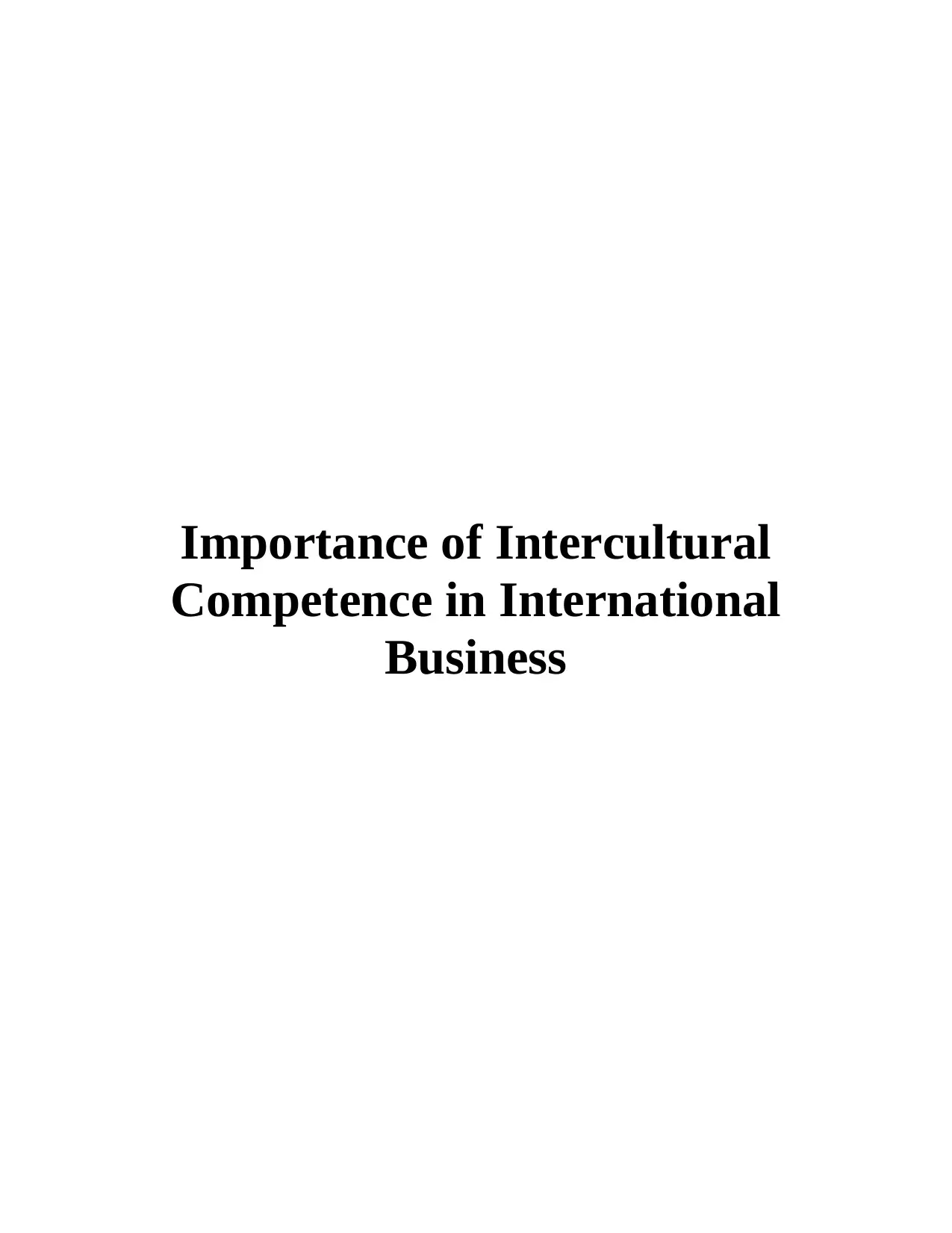
Importance of Intercultural
Competence in International
Business
Competence in International
Business
Paraphrase This Document
Need a fresh take? Get an instant paraphrase of this document with our AI Paraphraser
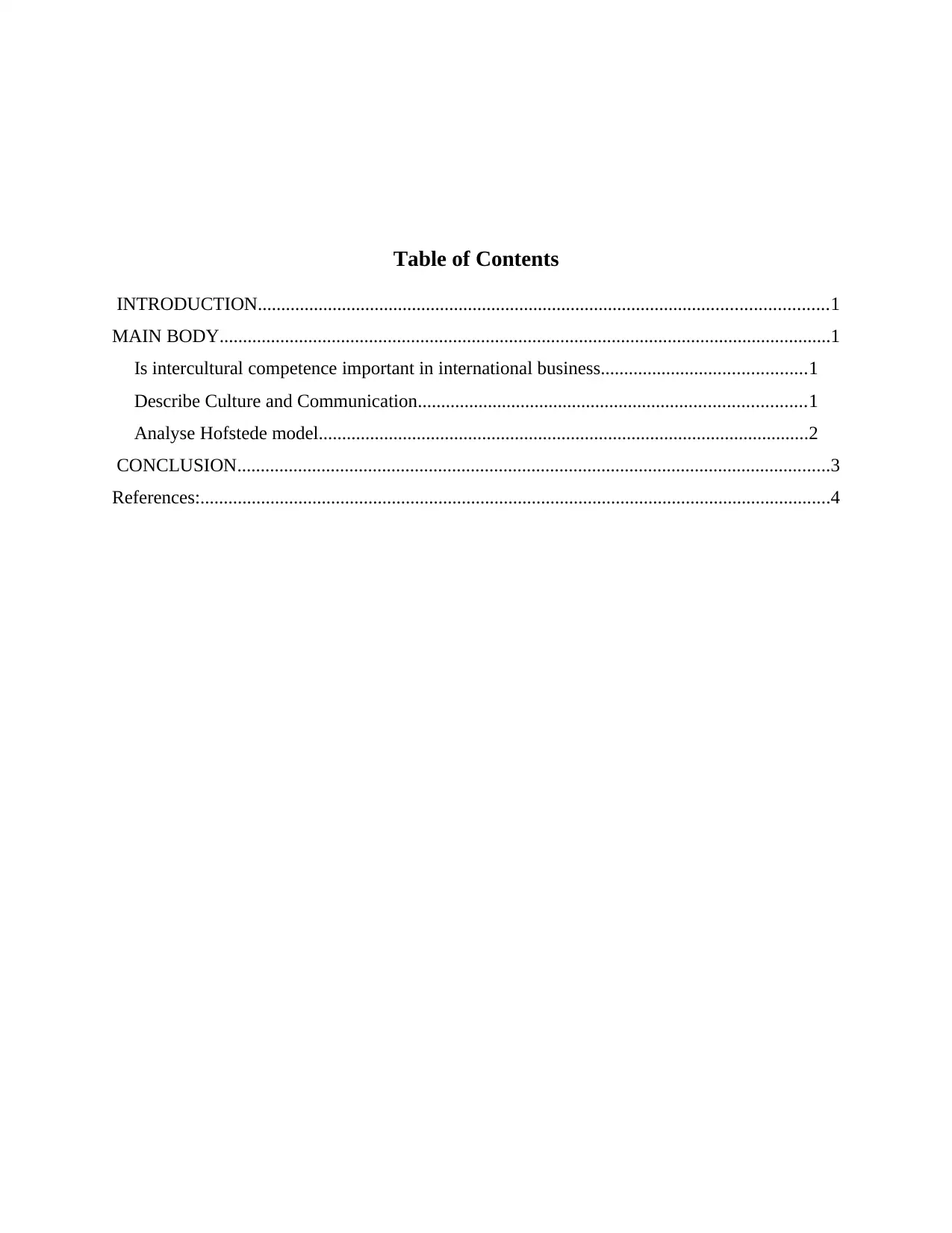
Table of Contents
INTRODUCTION..........................................................................................................................1
MAIN BODY...................................................................................................................................1
Is intercultural competence important in international business............................................1
Describe Culture and Communication...................................................................................1
Analyse Hofstede model.........................................................................................................2
CONCLUSION...............................................................................................................................3
References:.......................................................................................................................................4
INTRODUCTION..........................................................................................................................1
MAIN BODY...................................................................................................................................1
Is intercultural competence important in international business............................................1
Describe Culture and Communication...................................................................................1
Analyse Hofstede model.........................................................................................................2
CONCLUSION...............................................................................................................................3
References:.......................................................................................................................................4

⊘ This is a preview!⊘
Do you want full access?
Subscribe today to unlock all pages.

Trusted by 1+ million students worldwide
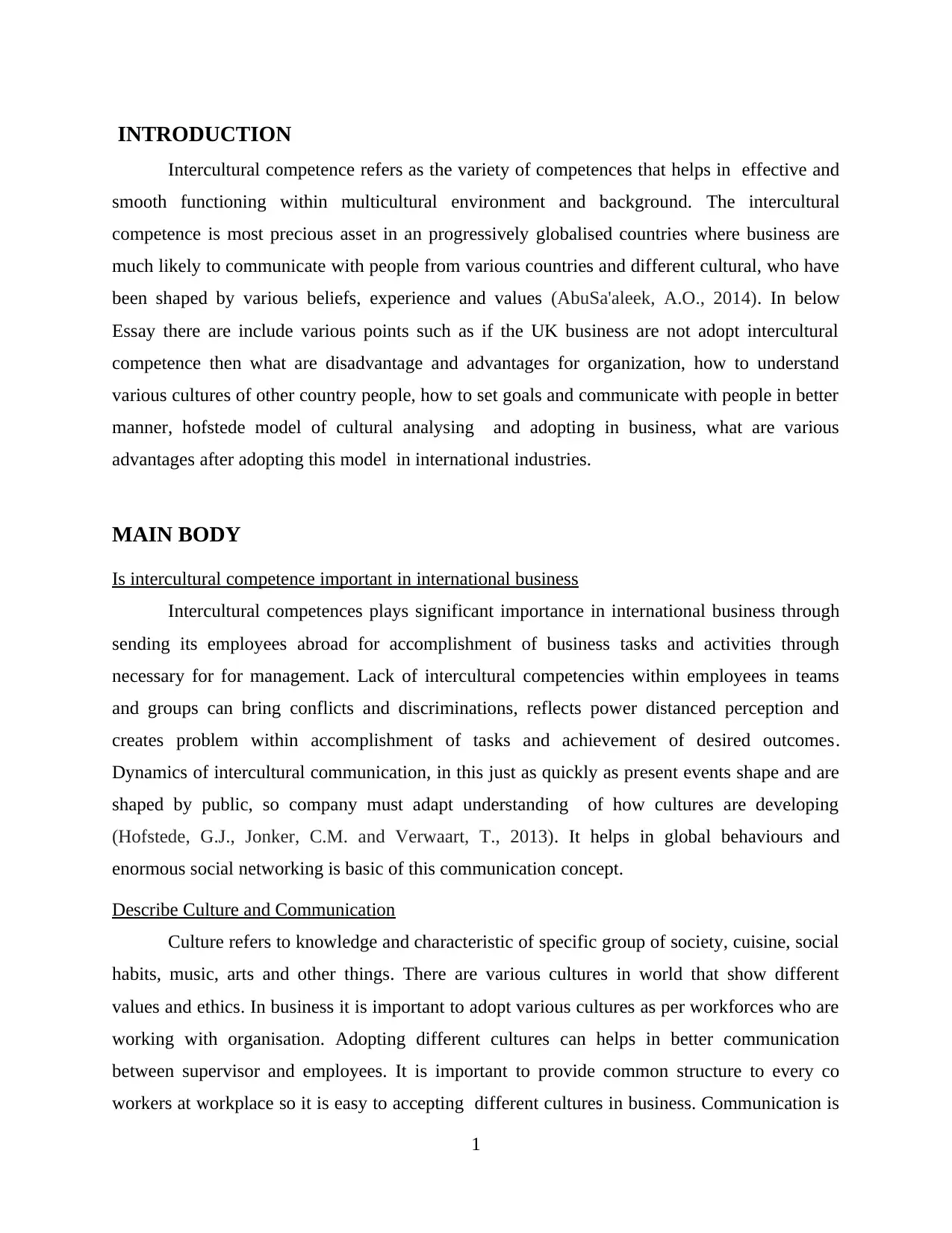
INTRODUCTION
Intercultural competence refers as the variety of competences that helps in effective and
smooth functioning within multicultural environment and background. The intercultural
competence is most precious asset in an progressively globalised countries where business are
much likely to communicate with people from various countries and different cultural, who have
been shaped by various beliefs, experience and values (AbuSa'aleek, A.O., 2014). In below
Essay there are include various points such as if the UK business are not adopt intercultural
competence then what are disadvantage and advantages for organization, how to understand
various cultures of other country people, how to set goals and communicate with people in better
manner, hofstede model of cultural analysing and adopting in business, what are various
advantages after adopting this model in international industries.
MAIN BODY
Is intercultural competence important in international business
Intercultural competences plays significant importance in international business through
sending its employees abroad for accomplishment of business tasks and activities through
necessary for for management. Lack of intercultural competencies within employees in teams
and groups can bring conflicts and discriminations, reflects power distanced perception and
creates problem within accomplishment of tasks and achievement of desired outcomes.
Dynamics of intercultural communication, in this just as quickly as present events shape and are
shaped by public, so company must adapt understanding of how cultures are developing
(Hofstede, G.J., Jonker, C.M. and Verwaart, T., 2013). It helps in global behaviours and
enormous social networking is basic of this communication concept.
Describe Culture and Communication
Culture refers to knowledge and characteristic of specific group of society, cuisine, social
habits, music, arts and other things. There are various cultures in world that show different
values and ethics. In business it is important to adopt various cultures as per workforces who are
working with organisation. Adopting different cultures can helps in better communication
between supervisor and employees. It is important to provide common structure to every co
workers at workplace so it is easy to accepting different cultures in business. Communication is
1
Intercultural competence refers as the variety of competences that helps in effective and
smooth functioning within multicultural environment and background. The intercultural
competence is most precious asset in an progressively globalised countries where business are
much likely to communicate with people from various countries and different cultural, who have
been shaped by various beliefs, experience and values (AbuSa'aleek, A.O., 2014). In below
Essay there are include various points such as if the UK business are not adopt intercultural
competence then what are disadvantage and advantages for organization, how to understand
various cultures of other country people, how to set goals and communicate with people in better
manner, hofstede model of cultural analysing and adopting in business, what are various
advantages after adopting this model in international industries.
MAIN BODY
Is intercultural competence important in international business
Intercultural competences plays significant importance in international business through
sending its employees abroad for accomplishment of business tasks and activities through
necessary for for management. Lack of intercultural competencies within employees in teams
and groups can bring conflicts and discriminations, reflects power distanced perception and
creates problem within accomplishment of tasks and achievement of desired outcomes.
Dynamics of intercultural communication, in this just as quickly as present events shape and are
shaped by public, so company must adapt understanding of how cultures are developing
(Hofstede, G.J., Jonker, C.M. and Verwaart, T., 2013). It helps in global behaviours and
enormous social networking is basic of this communication concept.
Describe Culture and Communication
Culture refers to knowledge and characteristic of specific group of society, cuisine, social
habits, music, arts and other things. There are various cultures in world that show different
values and ethics. In business it is important to adopt various cultures as per workforces who are
working with organisation. Adopting different cultures can helps in better communication
between supervisor and employees. It is important to provide common structure to every co
workers at workplace so it is easy to accepting different cultures in business. Communication is
1
Paraphrase This Document
Need a fresh take? Get an instant paraphrase of this document with our AI Paraphraser
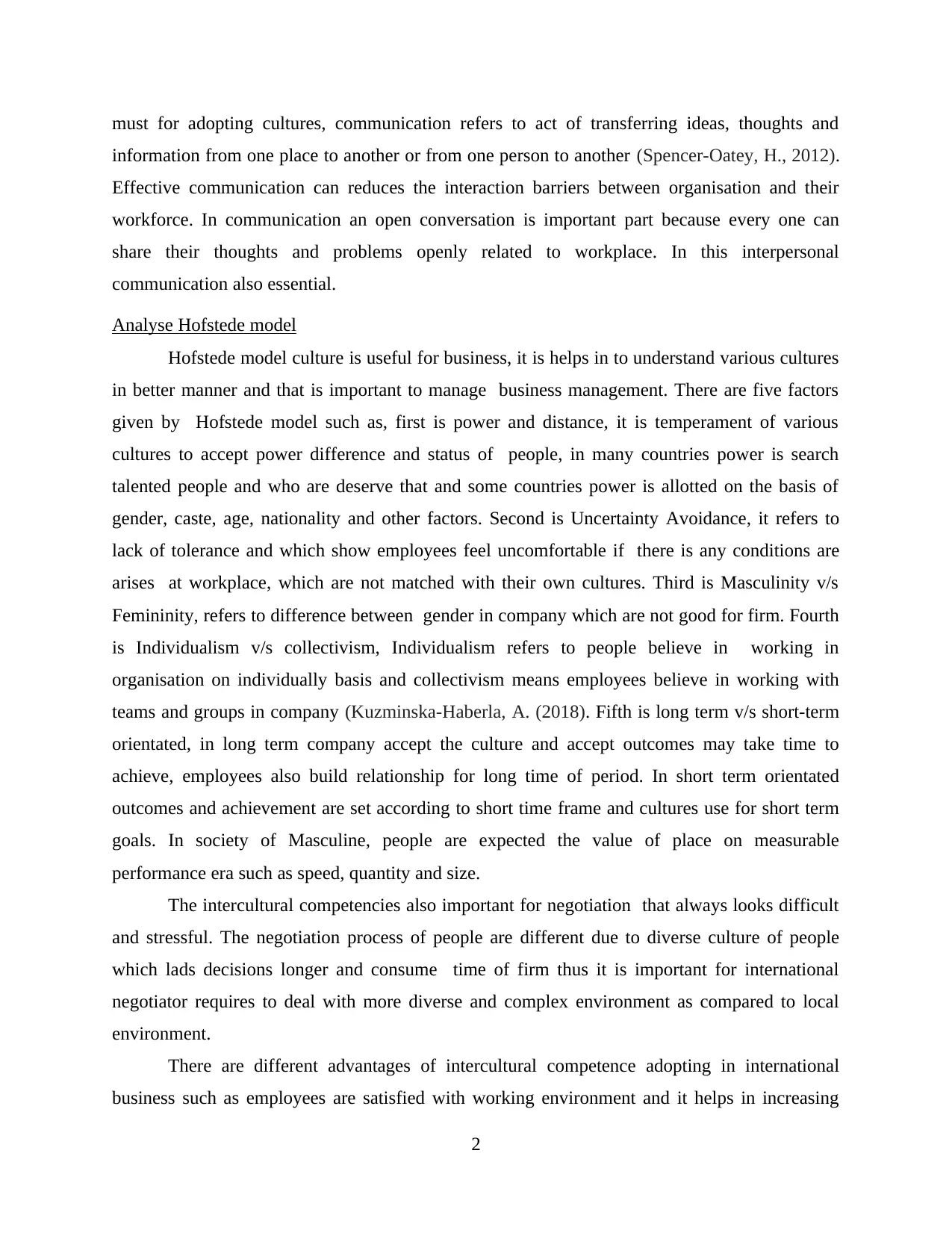
must for adopting cultures, communication refers to act of transferring ideas, thoughts and
information from one place to another or from one person to another (Spencer-Oatey, H., 2012).
Effective communication can reduces the interaction barriers between organisation and their
workforce. In communication an open conversation is important part because every one can
share their thoughts and problems openly related to workplace. In this interpersonal
communication also essential.
Analyse Hofstede model
Hofstede model culture is useful for business, it is helps in to understand various cultures
in better manner and that is important to manage business management. There are five factors
given by Hofstede model such as, first is power and distance, it is temperament of various
cultures to accept power difference and status of people, in many countries power is search
talented people and who are deserve that and some countries power is allotted on the basis of
gender, caste, age, nationality and other factors. Second is Uncertainty Avoidance, it refers to
lack of tolerance and which show employees feel uncomfortable if there is any conditions are
arises at workplace, which are not matched with their own cultures. Third is Masculinity v/s
Femininity, refers to difference between gender in company which are not good for firm. Fourth
is Individualism v/s collectivism, Individualism refers to people believe in working in
organisation on individually basis and collectivism means employees believe in working with
teams and groups in company (Kuzminska-Haberla, A. (2018). Fifth is long term v/s short-term
orientated, in long term company accept the culture and accept outcomes may take time to
achieve, employees also build relationship for long time of period. In short term orientated
outcomes and achievement are set according to short time frame and cultures use for short term
goals. In society of Masculine, people are expected the value of place on measurable
performance era such as speed, quantity and size.
The intercultural competencies also important for negotiation that always looks difficult
and stressful. The negotiation process of people are different due to diverse culture of people
which lads decisions longer and consume time of firm thus it is important for international
negotiator requires to deal with more diverse and complex environment as compared to local
environment.
There are different advantages of intercultural competence adopting in international
business such as employees are satisfied with working environment and it helps in increasing
2
information from one place to another or from one person to another (Spencer-Oatey, H., 2012).
Effective communication can reduces the interaction barriers between organisation and their
workforce. In communication an open conversation is important part because every one can
share their thoughts and problems openly related to workplace. In this interpersonal
communication also essential.
Analyse Hofstede model
Hofstede model culture is useful for business, it is helps in to understand various cultures
in better manner and that is important to manage business management. There are five factors
given by Hofstede model such as, first is power and distance, it is temperament of various
cultures to accept power difference and status of people, in many countries power is search
talented people and who are deserve that and some countries power is allotted on the basis of
gender, caste, age, nationality and other factors. Second is Uncertainty Avoidance, it refers to
lack of tolerance and which show employees feel uncomfortable if there is any conditions are
arises at workplace, which are not matched with their own cultures. Third is Masculinity v/s
Femininity, refers to difference between gender in company which are not good for firm. Fourth
is Individualism v/s collectivism, Individualism refers to people believe in working in
organisation on individually basis and collectivism means employees believe in working with
teams and groups in company (Kuzminska-Haberla, A. (2018). Fifth is long term v/s short-term
orientated, in long term company accept the culture and accept outcomes may take time to
achieve, employees also build relationship for long time of period. In short term orientated
outcomes and achievement are set according to short time frame and cultures use for short term
goals. In society of Masculine, people are expected the value of place on measurable
performance era such as speed, quantity and size.
The intercultural competencies also important for negotiation that always looks difficult
and stressful. The negotiation process of people are different due to diverse culture of people
which lads decisions longer and consume time of firm thus it is important for international
negotiator requires to deal with more diverse and complex environment as compared to local
environment.
There are different advantages of intercultural competence adopting in international
business such as employees are satisfied with working environment and it helps in increasing
2
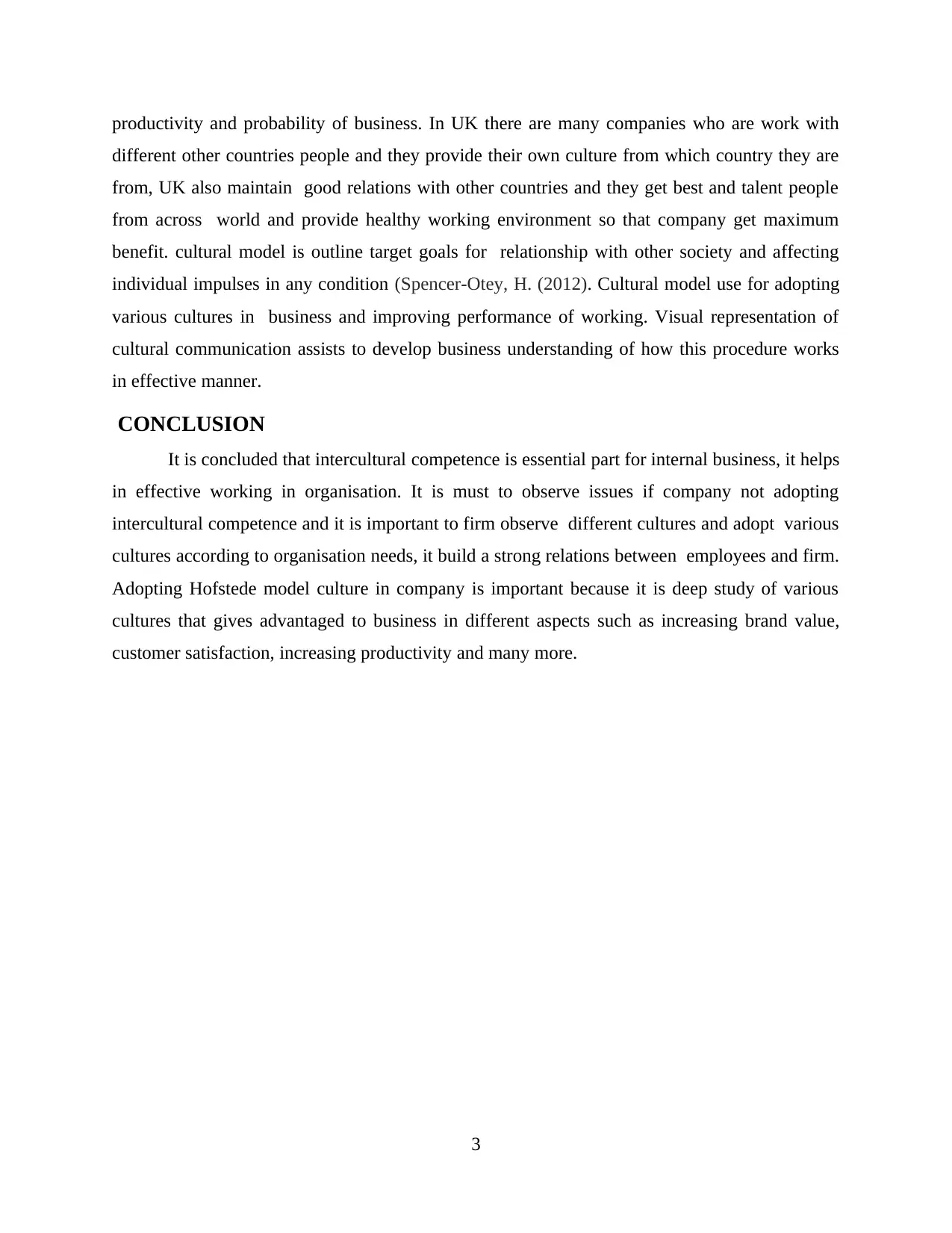
productivity and probability of business. In UK there are many companies who are work with
different other countries people and they provide their own culture from which country they are
from, UK also maintain good relations with other countries and they get best and talent people
from across world and provide healthy working environment so that company get maximum
benefit. cultural model is outline target goals for relationship with other society and affecting
individual impulses in any condition (Spencer-Otey, H. (2012). Cultural model use for adopting
various cultures in business and improving performance of working. Visual representation of
cultural communication assists to develop business understanding of how this procedure works
in effective manner.
CONCLUSION
It is concluded that intercultural competence is essential part for internal business, it helps
in effective working in organisation. It is must to observe issues if company not adopting
intercultural competence and it is important to firm observe different cultures and adopt various
cultures according to organisation needs, it build a strong relations between employees and firm.
Adopting Hofstede model culture in company is important because it is deep study of various
cultures that gives advantaged to business in different aspects such as increasing brand value,
customer satisfaction, increasing productivity and many more.
3
different other countries people and they provide their own culture from which country they are
from, UK also maintain good relations with other countries and they get best and talent people
from across world and provide healthy working environment so that company get maximum
benefit. cultural model is outline target goals for relationship with other society and affecting
individual impulses in any condition (Spencer-Otey, H. (2012). Cultural model use for adopting
various cultures in business and improving performance of working. Visual representation of
cultural communication assists to develop business understanding of how this procedure works
in effective manner.
CONCLUSION
It is concluded that intercultural competence is essential part for internal business, it helps
in effective working in organisation. It is must to observe issues if company not adopting
intercultural competence and it is important to firm observe different cultures and adopt various
cultures according to organisation needs, it build a strong relations between employees and firm.
Adopting Hofstede model culture in company is important because it is deep study of various
cultures that gives advantaged to business in different aspects such as increasing brand value,
customer satisfaction, increasing productivity and many more.
3
⊘ This is a preview!⊘
Do you want full access?
Subscribe today to unlock all pages.

Trusted by 1+ million students worldwide
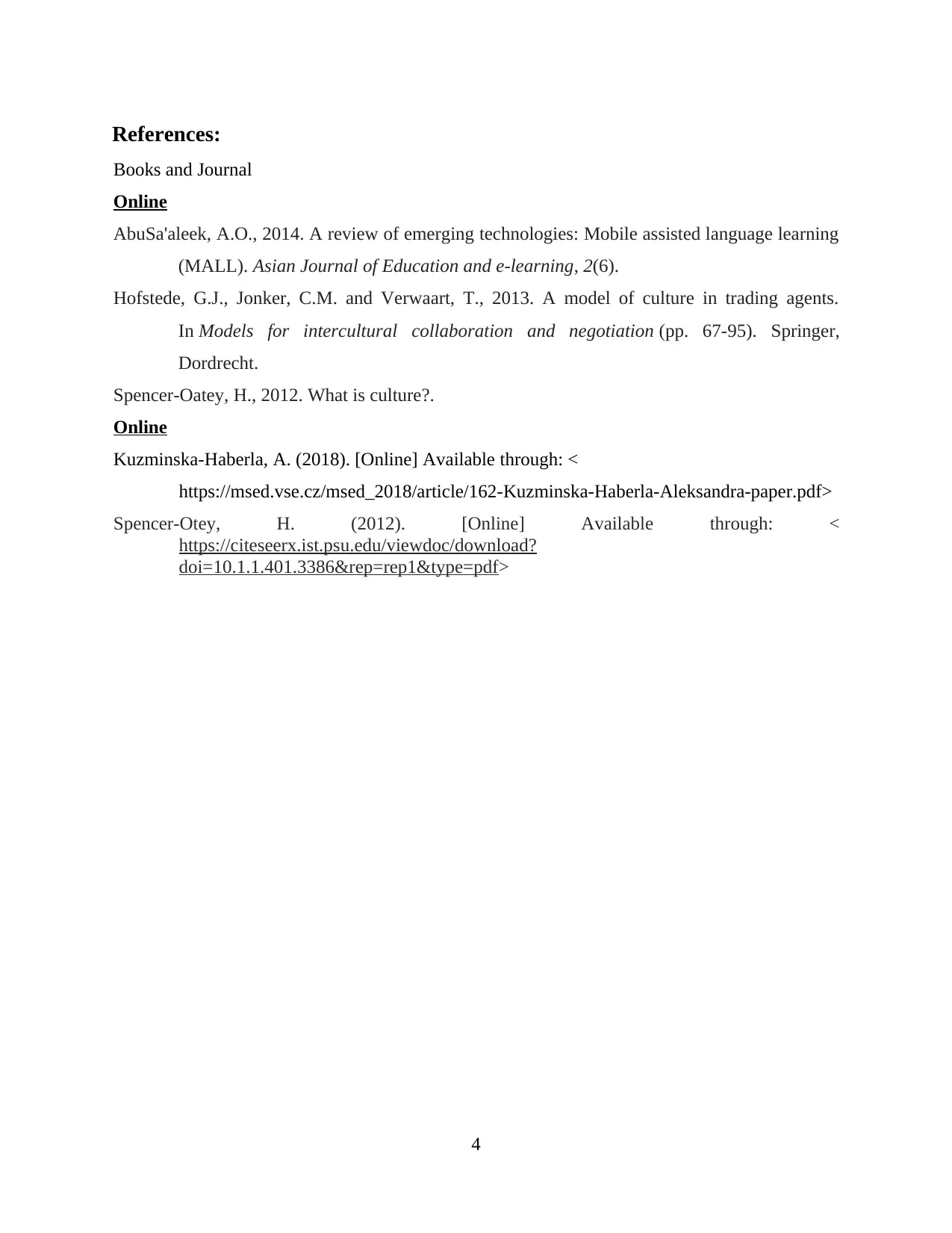
References:
Books and Journal
Online
AbuSa'aleek, A.O., 2014. A review of emerging technologies: Mobile assisted language learning
(MALL). Asian Journal of Education and e-learning, 2(6).
Hofstede, G.J., Jonker, C.M. and Verwaart, T., 2013. A model of culture in trading agents.
In Models for intercultural collaboration and negotiation (pp. 67-95). Springer,
Dordrecht.
Spencer-Oatey, H., 2012. What is culture?.
Online
Kuzminska-Haberla, A. (2018). [Online] Available through: <
https://msed.vse.cz/msed_2018/article/162-Kuzminska-Haberla-Aleksandra-paper.pdf>
Spencer-Otey, H. (2012). [Online] Available through: <
https://citeseerx.ist.psu.edu/viewdoc/download?
doi=10.1.1.401.3386&rep=rep1&type=pdf>
4
Books and Journal
Online
AbuSa'aleek, A.O., 2014. A review of emerging technologies: Mobile assisted language learning
(MALL). Asian Journal of Education and e-learning, 2(6).
Hofstede, G.J., Jonker, C.M. and Verwaart, T., 2013. A model of culture in trading agents.
In Models for intercultural collaboration and negotiation (pp. 67-95). Springer,
Dordrecht.
Spencer-Oatey, H., 2012. What is culture?.
Online
Kuzminska-Haberla, A. (2018). [Online] Available through: <
https://msed.vse.cz/msed_2018/article/162-Kuzminska-Haberla-Aleksandra-paper.pdf>
Spencer-Otey, H. (2012). [Online] Available through: <
https://citeseerx.ist.psu.edu/viewdoc/download?
doi=10.1.1.401.3386&rep=rep1&type=pdf>
4
1 out of 7
Related Documents
Your All-in-One AI-Powered Toolkit for Academic Success.
+13062052269
info@desklib.com
Available 24*7 on WhatsApp / Email
![[object Object]](/_next/static/media/star-bottom.7253800d.svg)
Unlock your academic potential
Copyright © 2020–2026 A2Z Services. All Rights Reserved. Developed and managed by ZUCOL.



